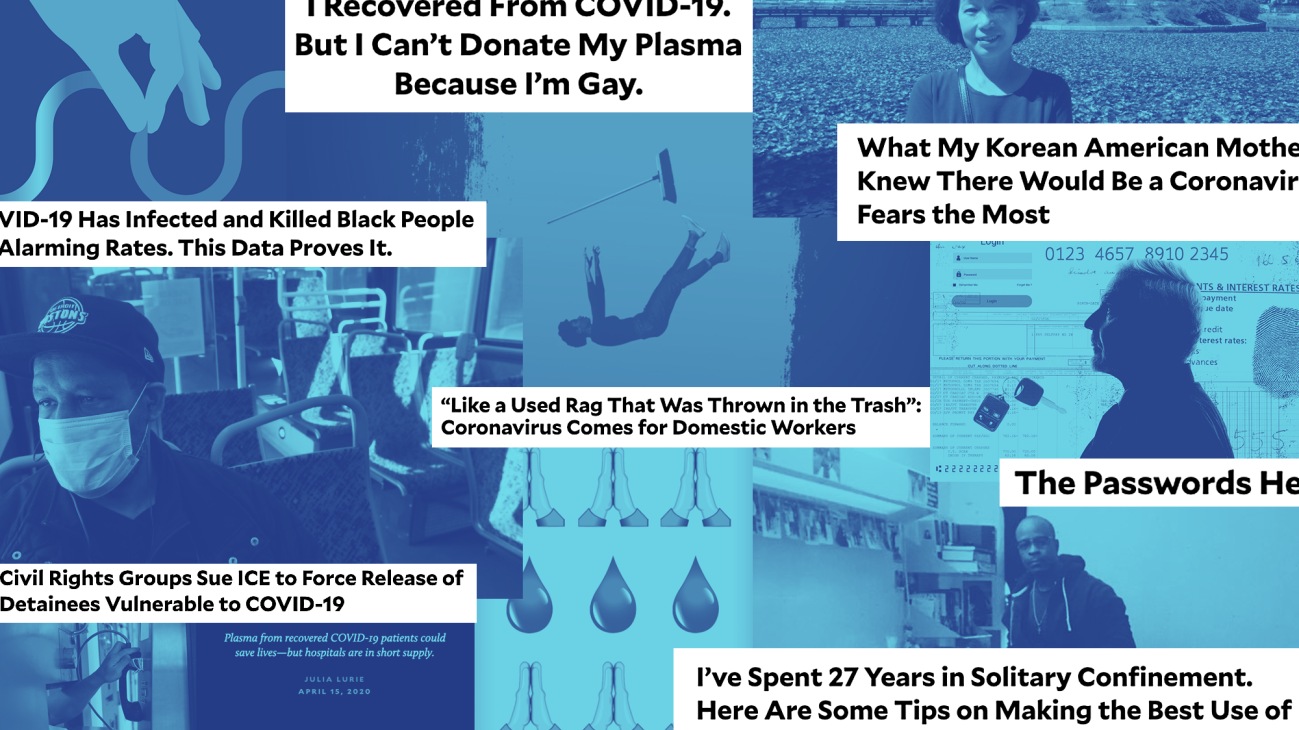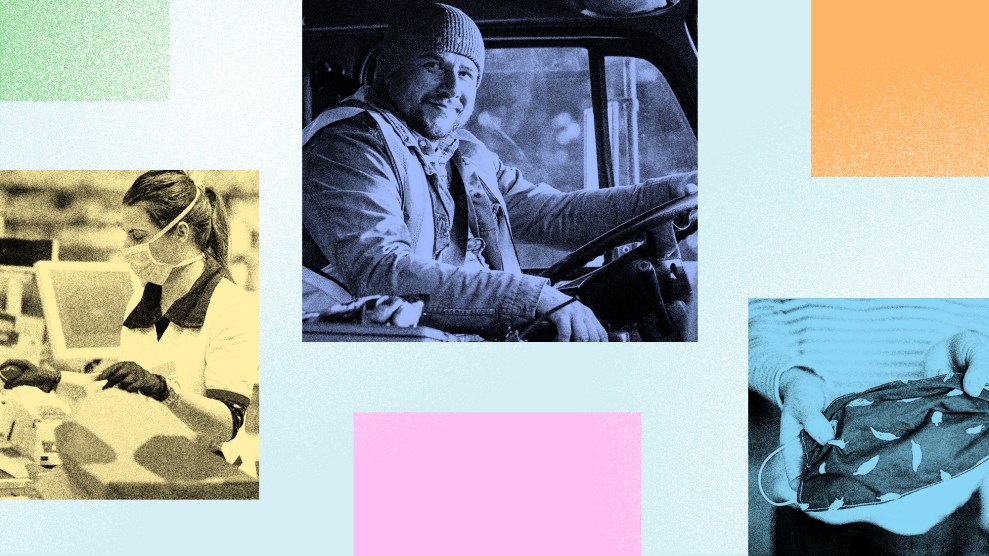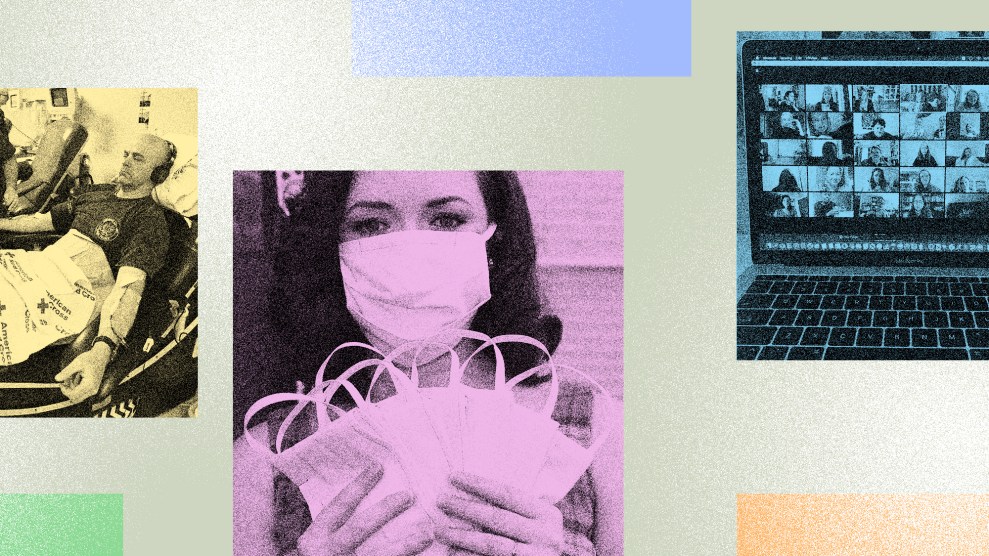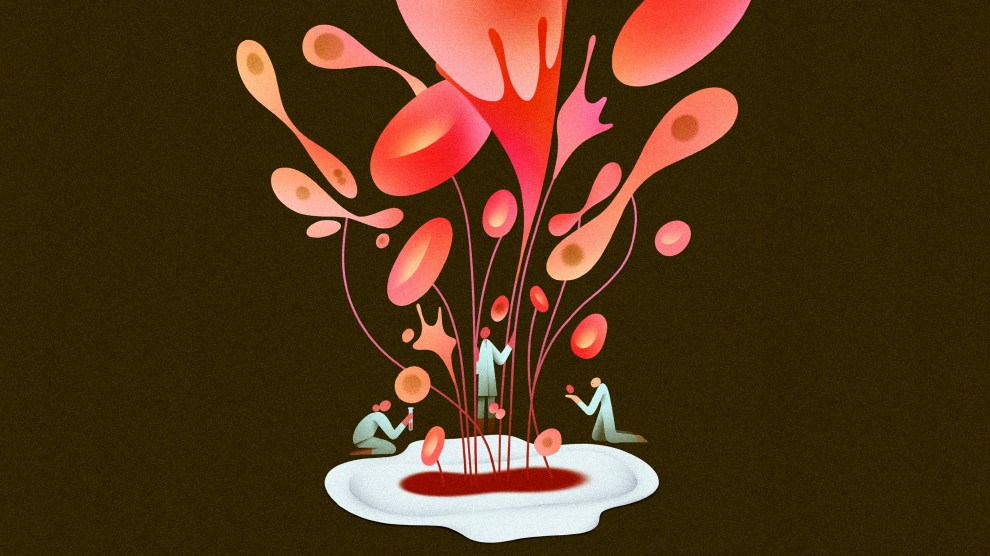
There isn’t much that’s routine these days, but here’s one of mine: Each morning when I start work (7 a.m., the 12-year-old doing online school next to me), and each night before I close the laptop for good, I read through messages from readers.
It’s been powerful hearing from so many of you about how you’re adapting, what has you concerned, and how you’re showing up for others. Just one example right off the bat: After reporter Fernanda Echavarri profiled a cleaner whose employers had discarded her, in her words, “like a used rag,” a reader—who himself is on a fixed income—reached out to give the woman his $1,200 stimulus check.
This kind of generosity, resolve, and resiliency is so critical to coming out of this the best we can. In his column, my colleague Brian Hiatt shared some of the ways Mother Jones readers are stepping up for others in their communities. But because we also got so many comments saying that independent, investigative journalism is critical right now, I wanted to share some of the ways Mother Jones’ newsroom is trying to step up and make a difference.
As you read through these highlights, I hope you’ll consider supporting our work with a donation if you’re in a position to do so. And if you can’t or already have (thank you!), I hope you’ll find some inspiration and perspective on the far-reaching implications of what we’re experiencing right now. These are just a small fraction of the 500-plus stories our newsroom has produced over the past month, but I picked them to highlight some of the top priorities our journalists have gone after.
Voting Rights and Election Security
This is a big one. Just before the full scope of the coronavirus crisis hit, the Washington Post’s Margaret Sullivan sounded the alarm that “the media is blowing its chance to head off an Election Day debacle.”
“I don’t buy the argument that there are insufficient newsroom resources,” Sullivan wrote. “After all, virtually every newsroom has at least some political reporters. And they often run in packs, producing scoop-oriented coverage that’s not much different from their peers at other networks or newspapers. But there are precious few voting-beat specialists. Prominent among that rarefied group are Pam Fessler at NPR and Ari Berman at Mother Jones.”
Sullivan is right. This is a huge and dramatically underreported story, and the coronavirus has pushed it even further to the side in a lot of newsrooms—even as this health crisis brings a whole new danger to the future of elections. That problem was on full display in Wisconsin’s primary meltdown. Ari Berman, our voting rights reporter, explained how that debacle came about not by happenstance or even incompetence, but through deliberate voter-suppression efforts going back to 2011. He also wrote the lead story for the voting rights package in the new issue of our magazine, “Republicans Are Trying to Kick Thousands of Voters Off the Rolls During a Pandemic,” which exposes another under-the-radar threat to the right to vote.
Meanwhile, AJ Vicens, who focuses on election security, has been investigating what elected officials are doing to avoid a debacle in November—it turns out there are a lot of proven solutions for expanded voting by mail, but the window for implementing them is closing soon—and how partisan politics is still blocking these common-sense fixes.
Debunking Disinformation
This was another priority we heard from the Mother Jones community—and our own colleagues. Like many immigrants, Sinduja Rangarajan, Mother Jones’ data journalist, found herself constantly batting down misinformation about the coronavirus in her extended family WhatsApp groups. (Cumin and other spices will cure the virus!) So she dug deeper and found that the platform is “a petri dish of misinformation,” something that its executives—and Facebook, which owns WhatsApp—have never fully addressed. Sinduja noted that researchers had come up with ways to slow the spread of viral hoaxes; a Facebook spokesperson told her the researchers had not contacted the company, but Sinduja obtained emails from the researchers to that very same spokesperson. After the story published, WhatsApp announced changes to its platform that will limit the spread of viral misinformation—changes that mirror those from Sinduja’s story.
The pharmacy chain CVS also changed course after Mother Jones’ reporting. Abigail Weinberg debunked a viral list of scientifically unfounded anti-coronavirus tips (drink warm water every 15 minutes!). It was our most read story in March. After it was published, a reader let Abigail know that CVS’s chief medical officer had sent some of the same false advice to the company’s entire staff. When she inquired, the company corrected the information, potentially saving thousands of front-line employees from harm.
Corruption and Mishandling of the Crisis
Where to begin? David Corn, MoJo’s Washington, DC, bureau chief, has been writing up a storm on how Trump is not only spectacularly mishandling the pandemic, but trying to turn that mishandling to his and his associates’ advantage. Early on, David exposed Jared Kushner’s ties to a company that was poised to cash in on coronavirus testing, and in “How the GOP’s War on Government Paved the Way for Trump’s Deadly Incompetence” he explained the broader forces that got us here. More recently, when David interviewed Elizabeth Warren via video chat, she unveiled her oversight plan for the administration’s giant big-business bailout “slush fund,” as she calls it. And he spoke to Rep. Adam Schiff about the Intelligence Committee’s plan to investigate how the Trump administration handled warnings about the pandemic.
Then there’s Russ Choma, Mother Jones’ money and politics reporter, who has been focused on the “nightmare conflict-of-interest scenario” where bailout money can benefit Trump’s family and businesses. And Dan Friedman is staying on top of his corruption and foreign influence beat, including this remarkable tale of “a dizzying array of secret foreign lobbying by a major donor to both political parties” in Los Angeles. Rebecca Leber, who covers climate and environmental policy, has been tracking all the ways in which the administration is racing to roll back environmental protections while no one is looking. These stories have been pushed aside in other media as all the focus is on the pandemic, but we can’t afford to take our eyes off them.
Pandemic Inequality
Since our very first magazine, printed back in 1976, Mother Jones has kept a sharp focus on issues of justice and equality, and this crisis is bringing those into sharp relief. As reporter Eddie Rios pointed out, the coronavirus is “not an equal-opportunity disease”—it affects those already vulnerable more painfully. He and our data reporter, Sinduja, published a powerful analysis showing that Black people are getting and dying from the coronavirus at dramatically higher rates.
Samantha Michaels, MoJo’s prisons reporter, has been one of the key voices reporting on how unprepared the criminal justice system is for a public health crisis. But a surprising story came about when she spoke with Keith LaMar, an inmate in Ohio who has spent 27 years in solitary confinement. He told her he wanted to help others on the outside cope with the isolation that so many of us are experiencing now and it has been one of our most read stories of the past month. Afterward, LaMar wrote Sam a letter: “I really appreciate what you did, Samantha; first, for reaching out to me and, second, for validating the value of my voice. It really means a lot—not just to me personally, but to all of us who have been left behind.”
Noah Lanard, who is part of Mother Jones’ immigration team, has been exposing the federal government’s shadow immigration detention system in the Southeast. A couple of weeks ago, Noah reported on litigation asking that detainees who don’t pose a threat to public safety be released; he also revealed that detainees, increasingly terrified of the coronavirus, have been punished harshly for protesting to ask for health protections. Noah’s stories were cited in two lawsuits by civil rights organizations demanding the release of immigrants with preexisting conditions.
There are so many other stories I could list. Some draw on personal experience: Inae Oh shared her conversations with her Korean-born mother about face masks, racism, and American individualism. Becca Andrews, born and raised in a small town in Tennessee, rose to explain what’s really behind the South’s exploding infection rate. Clara Jeffery, our editor in chief, penned a heartbreaking and heartwarming essay about her father’s passing and what we all need to do, at a moment when we may have less time to do so than we thought, to get our loved ones’ affairs in order. And James West told his story of recovering from COVID-19 but being barred from sharing his hard-won antibodies because he’s gay—which published one day before the FDA relaxed those regulations.
Other stories showcased both the desperation and the heroism that the crisis has brought about: After James’ experience trying to donate plasma, reporter Julia Lurie dug deeper and found a 30,000-strong network of survivors that helps families cope with the illness and tries to crowdsource survivor plasma donations as a potential cure. She profiled a woman, Kellie Burns, whose post seeking plasma drew hundreds of responses as her father fought for his life. When Julia called her before publishing to make sure she had gotten all the details of the story correctly, Burns said it meant a lot to her to share her family’s hard-won lessons. “We’re so happy to have this article,” she said through tears. “It’s one of the last things we’re trying to do for him.”
This crisis has made clear to me how desperately needed unrelenting journalism that doesn’t run with the pack is at a time like this—and how much it is at risk. I don’t know how America’s newsrooms, including Mother Jones, will do all that we need to do this year. But I know that we have an amazing community of readers and some of the fiercest journalists anywhere—and that’s how Mother Jones has made it work for 44 years now.
I hope this snapshot shows you how much it means when readers (not profits) make journalism happen. And if you’re able, I hope you’ll consider being part of that support. We had been planning on running a big fundraising campaign this month, but it didn’t feel right. So while we regroup and figure out how to square the budget, we’d be incredibly grateful for even just a handful of donations. This crisis is hitting us all in different ways and we want to be respectful of what we ask of you right now—but we very much need the help. (Thank you so much to everyone who has pitched in recently. It means a lot.)
I don’t know what normal will look like for us in the next few weeks, months, and years. But when I look at how MoJo’s reporters—and readers like you—have stepped up this last month, I know hard-hitting journalism that makes a difference will be part of it. Thank you.













